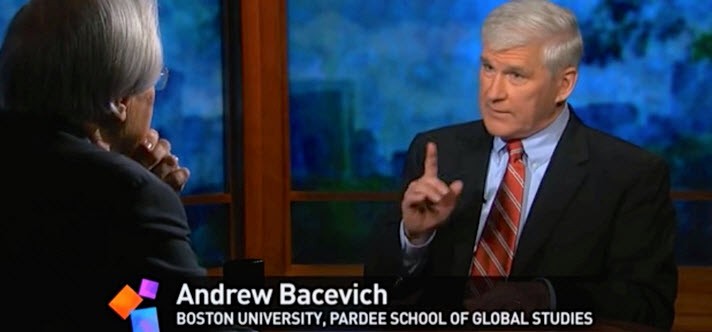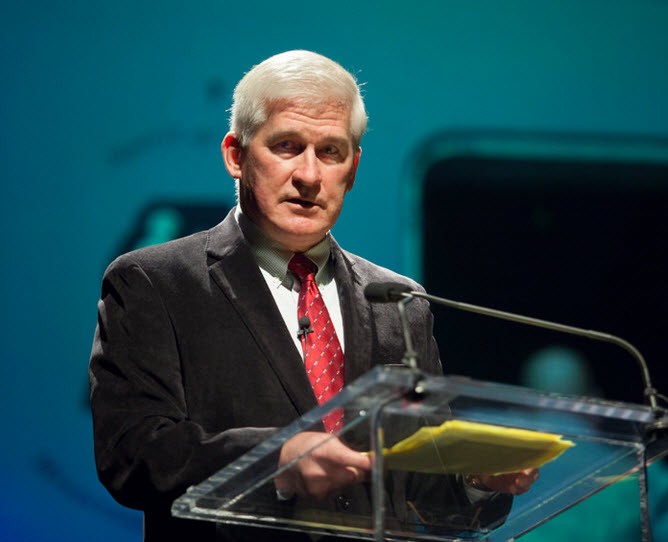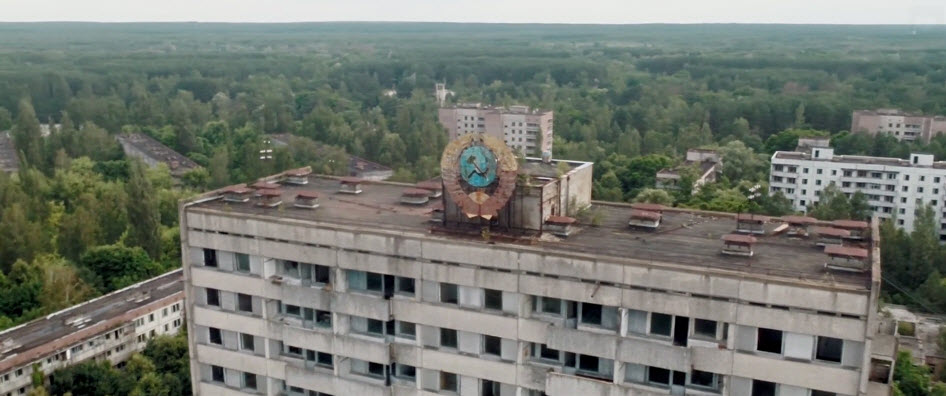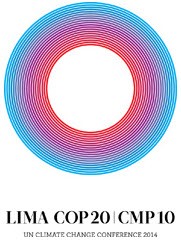Let’s begin by looking again at the ongoing war in the Middle East
and a man whose only son died in an Iraqi bombing –
Andrew J Bacevich – and move on to petrol states and the new climate change conference.
Let’s take a closer look … on December 1 with the end of Thanksgiving weekend in the U.S.
In Time of War
Recently Andrew Bacevich announced that he was leaving Boston University
A conservative, a Catholic, and a critic of the war in the Middle East and the strategic policy of the U.S., his exit from active academic life was accompanied by an interview with Bill Moyers
Following was the online coverage:
Andrew Bacevich, Professor of History and International Relations at the Frederick S. Pardee School of Global Studies and noted public intellectual has been busy discussing the implications of the unfolding developments in Iraq and what the right response to it may be.
In a broad-ranging interview on the PBS show Moyers & company, Prof. Bacevich pointed out that “war itself is evil. But war is an evil that should command our respect. War is something that we should not take lightly, that we should not discuss frivolously.”
He went on to make the argument in detail:
“I’m personally not persuaded that further military action in Iraq is actually going to produce an outcome more favorable than the last one. If what we have here on our hands in Iraq, in Syria, elsewhere in the Middle East is a humanitarian catastrophe, then let us become serious about asking ourselves, what is the appropriate response? What can the richest and most powerful country in the world do to alleviate the suffering of innocent people who are caught up in this violence?
And my answer to that question is not air strikes. My answer to that question is, well, if indeed we have a moral responsibility to come to the aid of suffering Iraqis and Syrians, then we better start opening up our wallets to be far more generous and forthcoming in providing assistance that people need.
You know, we live in a country where if you want to go bomb somebody, there’s remarkably little discussion about how much it might cost, even though the costs almost inevitably end up being orders of magnitude larger than anybody projected at the outcome. But when you have a discussion about whether or not we can assist people who are suffering, then suddenly we come very, you know, cost-conscious.”
Prof. Bacevich wrote about this in an earlier op-ed in The Los Angeles Times (June 13, 2014), ‘Can Obama Pull a Nixon with the Iraq Crisis?’ where he began by pointing out that “for the United States, the Iraq war ranks as the most consequential foreign policy failure since Vietnam,” and then speaks to the possible change in strategy:
“Ending the U. S. diplomatic estrangement from Iran could yield a strategic realignment comparable to that produced by the opening to China, its effects rippling across the greater Middle East. There, rather than in misguided proposals for renewed U.S. military action, lies Obama’s chance to demonstrate that he has grasped the lessons that Iraq (along with Vietnam) has to teach. One can imagine Nixon himself relishing the prospect.”
All of this, for Prof. Bacevich, has to be thought of given the context of “dominant foreign policy entrepreneurs in Washington DC who have been hawkish on war in this instance as well as all others”. He speaks to this in a recent essay in Commonweal (June 4, 2014), “The Duplicity of the Idealogues: US Policy and Robert Kagan’s Fictive Narrative,” which he concludes by suggesting with sad irony:
“When it comes to foreign policy, the president of the United States would be better served to consult a few reasonably informed citizens from Muncie, Indiana, than to take seriously advice offered by [idealogues].”
◊
The Next Book from Bacevich
Let’s move to his current endeavors.
First, Andrew Bacevich’s most recent interview and then a look at his forthcoming book.
Santa Fe, NM
Ann Jones with Andrew Bacevich, 12 November 2014 – Audio
Ann Jones with Andrew Bacevich, Talk, 12 November 2014 – Video
Ann Jones with Andrew Bacevich, Conversation, 12 November 2014 – Video
Lannan Foundation – http://www.lannan.org/bios/andrew-j-bacevich
Cited additional writings [TomDispatch]
“Breach of Trust” / NYT
http://en.wikipedia.org/wiki/Andrew_Bacevich
Your next book?
The working title is America’s War for the Greater Middle East. The book will make the case that all of our military adventures and misadventures in the Islamic world since 1980, when Jimmy Carter propagated the Carter Doctrine [that the Middle East was a vital US interest], should be seen as one war. Think about the Cold War: it consisted of many different episodes—the Korean War, Vietnam, intervention in Grenada, the Berlin airlift. If you step back, you see that they’re all part of this larger struggle called the Cold War. When we group all these episodes together, we learn certain important truths. And I want to do the same thing with our military effort in the Islamic world from 1980 down to the present…
I believe that the war for the greater Middle East is doomed to fail. From a policy perspective, there’s an urgent need to reflect on what this war has yielded, what lessons we can take from it.
I think the term “terrorism” is an excuse not to probe more deeply into the question of who is the adversary, what kind of threat does he represent, and what are we trying to achieve. One could argue that despite all the mistakes the United States made in the Cold War, there was this idea of containment of the Soviet Union. With one exception, there has not been a unifying idea with our war in the Middle East. The exception is in the immediate aftermath of 9/11, where the Bush administration set out to transform the region, using American military power, with the intent to democratize it. They imagined the Iraq War as the first step in this grandiose project. It was an arrogant idea, an implausible idea, and it failed. It failed when the liberation of Iraq created such a catastrophe that even today, they’re still grappling with it.
Is it fair to say that there’s an alternative, legitimate goal of our antiterrorist efforts—to keep ourselves safe from another 9/11?
I think it’s reasonable. The agencies are supposed to be keeping us safe, and they’re supposed to be doing it at a reasonable cost that tries to keep faith with the ideals that we represent. It’s not clear to me why invading Iraq or occupying Afghanistan for more than a decade is necessary to achieve that purpose.
○ ○ ○ ○
[T}he present moment is arguably one in which the international order is, in fact, undergoing a fundamental transformation. The “postwar world” brought into existence as a consequence of World War II is coming to an end. A major redistribution of global power is underway. Arrangements that once conferred immense prerogatives upon the United States, hugely benefiting the American people, are coming undone.
In Washington, meanwhile, a hidebound governing class pretends that none of this is happening, stubbornly insisting that it’s still 1945 with the so-called American Century destined to continue for several centuries more (reflecting, of course, God’s express intentions).
Here lies the most disturbing aspect of contemporary American politics, worse even than rampant dysfunction borne of petty partisanship or corruption expressed in the buying and selling of influence. Confronted with evidence of a radically changing environment, those holding (or aspiring to) positions of influence simply turn a blind eye, refusing even to begin to adjust to a new reality.
-=-=-=-=-=-=-=-=-=-=-
A New U.S. Secretary of Defense
On the Resignation of Chuck Hagel — and process of nominating the next wartime Pentagon civilian
One of the top candidates, Michele Flornoy, CEO of one of the leading ‘think tank’ strategic organizations, has a fellowship in the honor of the fallen Andrew Bacevich
Flournoy took herself out of consideration this week and announced her intention to stay at the Center for a New American Security. One of her public statements addressed Presidential strategic decision making — “There’s a real choke point,” Flournoy said about the President’s national security staff and process. “There’s only so much bandwidth and there’s only so much they can handle at one time. So, things start to slow down.”
Of course.
The perspective of Andrew Bacevich speaking to ‘the process’ of security and strategy is atypical of policy makers in DC, few of whom have had family engaged in Mid East wars and few of whom have the depth of experience to fully consider the full costs.
And, considering experience, what will be the range of experience of the next Secretary of Defense?
Who will follow Chuck Hagel as we look to the next ‘strategy’ coming from the President, his security team and the head of the Defense Department.
From DefenseOne
Who Will Be the Next Secretary of Defense
From Steve Clemons/Talking Points Memo
From The Week
Hagel Wasn’t the Problem, It’s America’s Addiction to Endless War
A corollary is how much civilian oversight is realistically possible in a world where the U.S. is positioned globally.
Per Base Nation, the U.S. still stations its troops at nearly a thousand locations internationally, more than two decades after the end of the Cold War,
◊
The subject of seemingly unending war is one of the focal points of Professor Bacevich as a thinker, writer, former military officer and father…
Here is his OpEd reflection on the former and the next Secretary of Defense
At the gut-level, Chuck Hagel represented this one idea: No more Vietnams. Yet when Hagel took office as defense secretary in 2013, the United States was already up to its neck in another Vietnam. Its rightful name, not yet acknowledged in Washington, is “America’s War for the Greater Middle East.”This misguided effort to use American military power to somehow fix what ails large parts of the Islamic world has become the ultimate quagmire. In short, Hagel had already failed before his first day working in the Pentagon. How Hagel himself did not see that rates as a mystery.
Back in 2009, perhaps naively, Barack Obama fancied that his calling was to extricate the United States from this War for the Greater Middle East. Today, in 2014, Obama has abandoned the attempt, albeit without publicly acknowledging his failure. His administration is no longer trying to get us “out.” It accepts that we are “in” and has given up on efforts to envision an alternative…
Count on Obama’s choice of a defense secretary to replace Hagel to spark tons of media chitchat… Yet substantively, the choice won’t matter much. In part, this is because the clock is running out on the Obama presidency. Yet of greater importance is this: In Washington, there exists neither the will nor the creative energy to change. So in our War for the Greater Middle East we will slog on, throwing good money after bad, singing the praises of the troops sent to perform a futile mission. That’s the mournful and dispiriting task that Hagel’s successor will be expected to perform.
-=-=-=-=-=-=-=-=-=-=-
On the questions of overview, strategy and SecDef succession, let’s move on to a warning, a relics of nuclear times…
Drones over Chernobyl for a change of pace… a ‘no go zone’
and, as we are in Russia, we are picking up on a number of asynchronous reports regarding how the Malaysian airliner was shot down, now comes another report, a Russian documentary that claims the MH17 shoot-down was by a Ukrainian SU-25
Going farther into expanding geo-political tension, there are increasing numbers of ‘close encounters’, e.g., Su-27s
They patrol over the Baltic, intercept NATO and Swedish spy planes in international air space and, on occasion, harass the rival planes so aggressively that they have no choice but to flee. If any Russian planes end up causing an international incident in the tense Baltic region, it will likely be the Kaliningrad Su-27s.
◊
Moldova is coming onto the East vs West radar — per the Wall Street Journal
CHISINAU, Moldova—A Cold War-style spy saga involving guns, gangsters and the Russian security services is roiling this tiny ex-Soviet state before its election, which has become crucial battleground in the tug of war between Europe and Moscow.
◊
And the BRICS continue to grow in opposition to the U.S. — not to be set aside and increasingly important in any assessment of the future
◊
While China attempts to build and keep a virtual Online Wall of China in place, the ways around any attempt at a closed society are eventually going the way of the old wall and walls around any society — they cannot keep out ideas… and ideas of change will find a way
◊
Then, of course, there are ‘Caliphate’ ideas that go back hundreds of years or so and these ideas, as a reaction to current events, have traction but not staying power. The old eras have gone and the Caliphate-ways of the old days have little chance against rights, economic development and better days for the next generation. The question is who and what will bring better days?
◊
“Better days” sounds like politics, a slogan, a never-ending political campaign promise but consider its obverse — worse days are ahead, but perhaps worse day are ahead… much worse
If the extension of Iran nuclear talks brings a failed agreement and war, as many are urging, there will be a price, a price greater than that paid in Afghanistan and Iraq. Iran is no Iraq. The estimated $4 to 6 trillion in spending in Iraq and Afghanistan will hold no match to what is in store if war is expanded to Iran — and any war against Iran will necessarily wrap in alliances.
Iran and China are a growing reality as an alliance, Iran and Russia are a present reality — then take another step… Iran and Iraq are more than allies, they are embedded partners, as are many interests… in a future StratDem review, we will go into detail, but provocation and war, neo-con/neo-lib policy for widened war will come with a greater price than mainstream media projects currently.
The entangling alliances, the BRICS, the pieces in place and the adjustments that will occur in the event there is an attack on Iran will ensure long-lasting repercussions, even beyond current repercussions in the region, blowback and generational strife.
Relations between Iran and factions opposed to Saudi Arabia and Wahhabism must be considered as religious militants sweeps across the Mid East in Wahhabi-related ISIL/ISIS/IS and other groups that bring layers of war.
Take a look at this, this and this to get a feel of forces for war at work, broader war, entangled alliance war.
Foreign Policy’s and Rand’s point of view… not to be underestimated as a Republican-controlled Congress urges an end to negotiations, diplomacy and an escalation to further war.
The President is moving — and the move is to accommodation, a more robust policy, a more active, aggressive Secretary of Defense.
If these were Romans time, we would be looking at ‘augering’, bringing out the soothsayers to view flight of birds and signs from nature as to the course of the war campaigns in the foreign territories.
These are not Roman times, but the questions of over extension of resources, of policy and security, are on the minds of many as security demands challenge traditional, orthodox responses.
What do the soothsayers predict?
◊
Oil/Gas Skirmishing
The vision of petro-dollars join into political strategy as OPEC and producer decisions to take oil into decision-making — and politics “by other means”, economic pressure and war-making in effect.
The latest mix of security and market forces brings another level of risk going forward.
Experts on matters petro are failing to predict how the players will act, as both strategic and market imperatives operate and, sub rosa, politics plays out…
This week was revealing as OPEC chose to keep production as is, hoping to maintain market share, while other forces percolated behind the scenes, e.g., diplomatic initiatives and strategic demands, the level of demands that involves pressure on states (Russia) who are relying on petro-revenues and, in the event the revenues fall due to falling prices, their positions globally, militarily, economically are damaged, potentially profoundly and consequentially.
Scan some of the latest information about the petro-skirmishing — the layers of decision-making are deep.
Oil prices plunging, Russia buckles
◊
Financial Times, December 1, 2014
as the market opens …
Oil rout resumes, prices lowest since 2009
The end of an oil era?
The bottom has dropped out of the oil market, with both main pricing benchmarks shedding over $2 to trade at their lowest levels in five years.
The price of a barrel of Brent oil fell as much as 3.7 per cent to a low of $67.53 today, while the West Texas Intermediate dived to a low of $63.72, also down as much as 3.7 per cent. At pixeltime the benchmarks were trading at $67.92 and $64.05 respectively.
That is the lowest since mid-2009.
Rouble falls by most since 1998 Russian crisis
The Russian rouble has smashed past the 50 per US dollar mark for the first time in history, as sliding oil prices ramp up pressure on the Russian currency.
The rouble is comfortably the worst performing major currency in the world this year, and extended its 2014 dive against the dollar to 36.4 per cent today by slumping another 4.5 per cent to trade at 51.668 in early London trading.
That decline is the worst since the Russian financial crisis of 1998.
The Russian currency has been hurt by ongoing capital outflows, exacerbated by a series of westerns sanctions slapped on Moscow over its annexation of Ukraine’s Crimea region and support for separatists in eastern Ukraine, but more recently the oil price tumble has taken the heaviest toll.
The economy is heavily dependent on oil, whose price nosedived last week after Opec decided against cutting oil production to buttress prices. That has sent both the WTI and Brent price benchmarks to four-year lows, and hammered the currencies of oil-exporting countries like Nigeria and Russia.
Petro conflict continues to heat up as political pressure is brought to bear and the Russian bear takes hits …
Costs to Russia about $140 billion —7% of GDP — in the last year, says finance minister
The falling oil price is costing Russia up to $100bn a year, while Western sanctions have hit the country by $40bn, its finance minister has said.
Anton Siluanov made the comments on Monday at an international financial and economic forum in Moscow.
◊
While the worlds of oil/gas are enmeshed in turmoil and conflict, in the larger picture the threat to global climate continues unabated.
UN climate talks begin as global temperatures break records
BBC
UN climate negotiators are beginning meetings in Peru to try to advance talks on a new global agreement.
Guardian
COP20 is a forum for regional green policies not just global climate targets
USAToday
Clock ticking, U.N. Climate Talks Resume in Lima
The Peruvian government said more than 12,000 police would protect the conference, which will be held in a tent city on the grounds of the military headquarters.
◊
and, while petrol states skirmish, and the U.S. depletes its treasury and productive assets as decades of war continue, the Chinese strategy continues…
International Business Times
Global Warming: UN Climate Summit to Begin in Peru Amid Dire Predictions by Scientists
○ ○ ○ ○
Conference of the Parties
Sustainable Innovation / Green Economy
○ ○ ○ ○
Globe and Mail
China at Forefront of Clean-energy
China has emerged as the leader in the race to dominate the fast-growing, global clean-energy market, an economic strategy that promises to deliver huge dividends as world governments work toward an agreement to rein in greenhouse gases in the battle against climate change.
China is leaving its competitors in its wake as all countries look to gain advantage in the emerging low-carbon economy, according to new analysis…
◊
More to follow …








By one estimate, the United States has spent $10 trillion protecting Persian Gulf oil supplies over the past four decades.
Approaching its 35th anniversary, the strategy of maintaining such a structure of garrisons, troops, planes, and ships in the Middle East has been one of the great disasters in the history of American foreign policy. The rapid disappearance of debate about our newest, possibly illegal war should remind us of just how easy this huge infrastructure of bases has made it for anyone in the Oval Office to launch a war that seems guaranteed, like its predecessors, to set off new cycles of blowback and yet more war.